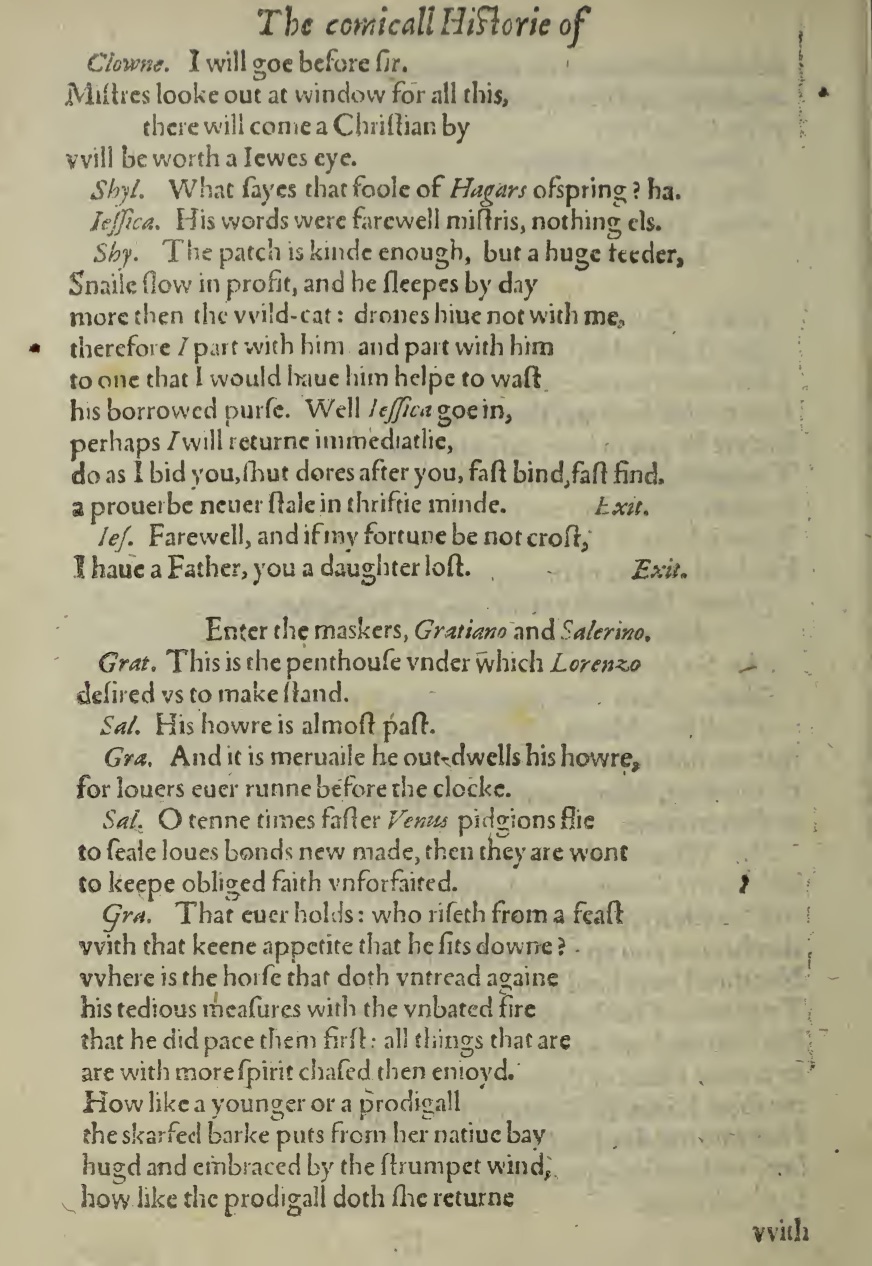Editorial note
Firstly we decided to use a modernized version of the excerpt to make it more accessible for modern audiences in this digital space. We also chose to label the lines with the characters' full names rather than their abbreviated names/titles for clarity. We had considered using color to indicate where these two changes occurred, but we instead made the choice to use color to highlight the several threads/patterns running through the excerpt.
The green is used to indicate the pattern of money language in this section, drawing attention to the characters' obsession with material profit.
The purple is used to indicate the pattern of time, and how the characters place the idea of love within time as limited and fleeting.
The red is used to indicate the pattern of love, as this idea of it as fleeting and momentary contrasts the characters' less temporal sense of profit, which is allowed to consume all of their time.
Lastly the blue is used to indicate religious references, and highlights how several religions are referenced and used as figurative language in the section.
LANCELET I will go before, sir. Aside to Jessica. Mistress,
look out at window for all this.
There will come a Christian by
Will be worth a [1]Jewess’ eye. He exits.
SHYLOCK What says that [2]fool of Hagar’s offspring, ha?
JESSICA His words were “Farewell, mistress,” nothing else.
SHYLOCK The patch is kind enough, but a huge feeder,
Snail-slow in [3]profit and he sleeps by day
More than the wildcat. Drones hive not with me,
Therefore I part with him, and part with him
To one that I would have him help to waste
His [4]borrowed purse. Well, Jessica, go in.
Perhaps I will return immediately.
Do as I bid you. Shut doors after you.
Fast bind, fast find—
A proverb never stale in [5]thrifty mind. He exits.
JESSICA Farewell, and if my [6]fortune be not crossed,
I have a father, you a daughter, lost.
She exits.
Desired us to make stand.
SALARINO [7]His hour is almost past.
GRATIANO And it is marvel he outdwells his hour,
For lovers ever run before the clock.
SALARINO O, ten times faster [8]Venus’ pigeons fly
{9]To seal love’s bonds new-made than they are wont
To keep obligèd faith unforfeited.
GRATIANO That ever holds. Who riseth from a feast
With that keen appetite that he sits down?
Where is the horse that doth untread again
His tedious measures with the unbated fire
That he did pace them first? All things that are,
Are with more spirit chasèd than enjoyed.
[10]How like a younger or a prodigal
The scarfèd bark puts from her native bay,
Hugged and embracèd by the [11]strumpet wind;
How like the prodigal doth she return
Footnotes
[1] This means it’s worth a lot. This refers to the violent ways that people removed money from Jewish people.
[2] Shylock is comparing Lancelet to Ishmael, who is a religious figure. Him and his mother, who was a servant, were outcast after his birth.
[3] Shylock is complaining about Launcelot’s inefficiency in his work. He works so slow that Shylock makes barely any profit.
[4] Shylock meant that Launcelot will assist Launcelot in wasting the money from his master Bassanio.
[5] Shylock warned Jessica a to protect herself from external forces. Shylock was telling Jessica to be financially stable and not to give in to temptation.
[6] Jessica is inclined to give up her father and her rich lifestyle to be with Lorenzo. Jessica stated that she will be lucky if they lose each other and loses her rich lifestyle in order to be with Lorenzo.
[7] Graziano and Salerio are talking about how Lorenzo and Jessica are running late. Graziano thought it was weird they were running late because he used a stereotype that new couples are early to everything.
[8]Religious reference to twelve doves that pulled the Goddess of Love’s golden chariot in ancient mythology.
[9] This refers to the time that fleets by faster for new couples than those who who have been together for years. In modern terms, new couples go through the “honeymoon phase”, which is the easy fun part of the relationship where time escapes.
[10] This refers to the “Parable of the Lost Son” in the Bible. Jesus told the story of the man who had two sons and divided a piece of land in two for each son. The younger son wasted the inheritance he was given and packed up to travel to a distant land where a terrible famine hit. Then he went to work at a farm where he fed pigs.
[11] This refers to how time goes by fast when exciting things are happening in a person’s life and the person is enjoying it. Graziano is describing the feeling that people feel when they fall in love or enter into a new relationship.
Image credit: Rare Books & Manuscripts Department, Boston Public Library, copy G.176.16. The most excellent historie of the merchant of Venice. First Quarto. London: 1600.
Citing this page: Shakespeare, William. The Merchant of Venice, D1v. London: 1600. Cacodemon Digital Shakespeare. Edited by [your names]. Source edition: Rare Books & Manuscripts Department, Boston Public Library (copy G.176.16). http://cacodemonshakespeare.com/comedies/merchant/d1v.
